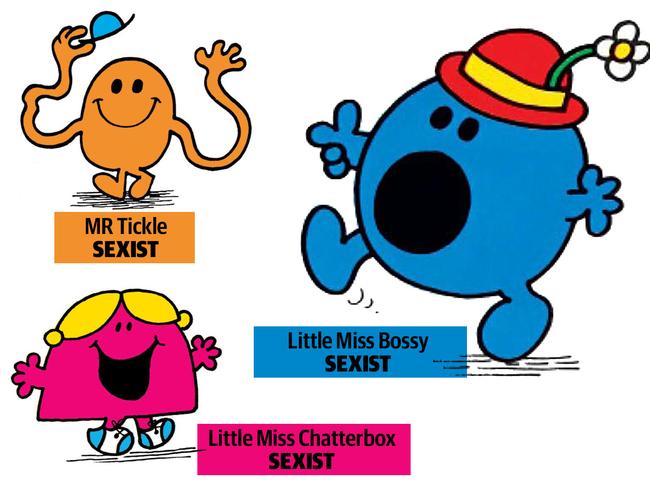Mr Men and Little Miss books labelled ‘sexist’ by British academic
ACADEMICS have launched an assault on the beloved Mr Men and Little Miss books and concluded that Roger Hargreaves’s simple tales portray the female characters as less powerful sparking yet another gender equality debate.
NSW
Don't miss out on the headlines from NSW. Followed categories will be added to My News.
THERE’S Mr Tickle, Mr Bump, Mr Messy — and now apparently there’s Mr Sexist.
Academics have launched an assault on the beloved Mr Men and Little Miss books and concluded that Roger Hargreaves’s simple tales portray the female characters as less powerful.
British researcher Madeleine Pownall — who has written entire papers on the importance of slam poetry — spent several months studying the books for signs of sexism. She found, in addition to male characters being given an average of 12 extra words, the Little Miss characters needed to be “saved” more than half the time while the Mr Men characters only needed saving one third of the time.
The study claims even the names of some characters, like Little Miss Bossy might play to gender stereotypes
The findings were based on 47 Mr Men and 34 Little Miss books authored by Hargreaves from 1971 to 2014.

But Australian parenting expert Dr Justin Coulson slammed the study, saying it had “hijacked” the legitimate conversation around gender equality and taken it too far.
“Mr Men and Little Miss books are not about having a gender debate and this is not a forum for it,” Dr Coulson said. “We are talking about 12 words a book per average and I don’t think kids are counting words.
MORE
MIRANDA DEVINE: Catholic school in crisis over gender fluidity
MIRANDA DEVINE: Santa Sabina parents fight back after gender row

“They are making a weak argument that there could be a subliminal socialising effect here and my thoughts are that we can make the mistake of taking this stuff too far.
“There are plenty of other examples of genuine gender inequality in the arts world and we need to be concentrating on them rather than these books. A part of me says, ‘Come on, for goodness sake’ when I hear this and I shake my head.”
In the study Ms Pownall criticised several passages for their reinforcement of “stereotypical” gender roles, including, “she managed to find herself the perfect job. She now works for Mr Lazy! She cooks and cleans for him” and “I know what that naughty little lady needs”.
“Generally, female characters were more passive, had less direct speech and needed to be saved more than male characters,” Ms Pownall said.
The study was presented at the British Psychological Society’s annual conference.
Ms Pownall said she hoped her work would help parents navigate issues related with “gender” and “power”.
“I think it’s interesting how parents may not necessarily be aware of how powerful messages in books can be, particularly how ideas about gender, power and relationships can be transmitted through story books,” she said.
“I’m also interested in exploring the different ways that parents choose, use, and interact with books for their children. The Mr Men series lends itself well to critical discussions about gender because they are so popular and memorable.
“This seems to be an area within psychology that everyone holds some view on, and I look forward to discussing it.”



